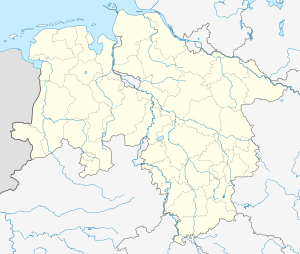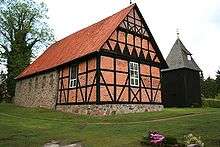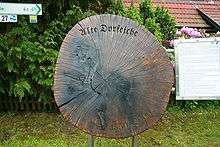Undeloh
Undeloh (Low German: Unnel) is a village in the district of Harburg, in Lower Saxony, Germany.
Undeloh | |
|---|---|
 Coat of arms | |
Location of Undeloh within Harburg district   | |
 Undeloh  Undeloh | |
| Coordinates: 53°11′46″N 9°59′00″E | |
| Country | Germany |
| State | Lower Saxony |
| District | Harburg |
| Municipal assoc. | Hanstedt |
| Area | |
| • Total | 48.2 km2 (18.6 sq mi) |
| Elevation | 85 m (279 ft) |
| Population (2018-12-31)[1] | |
| • Total | 999 |
| • Density | 21/km2 (54/sq mi) |
| Time zone | CET/CEST (UTC+1/+2) |
| Postal codes | 21274 |
| Dialling codes | 04189 |
| Vehicle registration | WL |


Geography
Location
Undeloh lies on the Lüneburg Heath near its highest hill, the Wilseder Berg.
Municipal divisions
The municipality or parish of Undeloh consists of 6 villages: Undeloh, Wehlen, Wesel, Meningen, Thonhof and Heimbuch.
Politics
Parish council
The parish council, which was elected on 10 September 2006, is made up as follows:
- CDU 5 seats
- SPD 1 seat
- FDP 1 seat
- UWG Undeloh 2 seats
(as at: the local elections of 10 September 2006)
Coat-of-arms
A red clock tower with a green roof on a green base; in the left-hand black field a gold set of stag's antlers with a silver skull.
Economy and infrastructure
Undeloh is a popular destination on the heath, especially for the Hamburg region.
Transport
- Car:
The nearest motorway exit is Egestorf on the A7.
- Railway:
The nearest railway station is at Handeloh (11 km), but there is a better train service at Buchholz (22 km).
- Bus:
Undeloh linked by KVG regional bus lines number 4207 (to Hanstedt/Hamburg-Harburg) and 5200 (to Salzhausen/Lüneburg). These lines belong to the Hamburg Transport Association (Hamburger Verkehrsverbund or HVV).
In addition public schoolbuses run to schools at Egestorf, Hanstedt and Buchholz (lines 4611 and 4631).
Origins and history
The name Undeloh means something like "grove by the head of a stream" (Quellhain). A small pond, the so-called Hungerteich (aka the Hungerpohl), presumably supplied a lot of water in times of drought and could be used to water the fields and cattle. In addition tradesmen came from around the region in order to see whether it would be a dry or wet year.